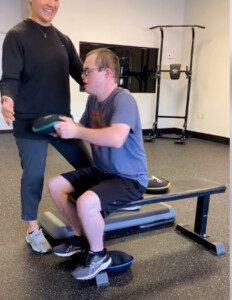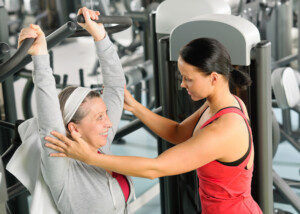This quiet gym specializes in training autistic and other challenged adults and youth to achieve their fitness goals. And its owner is autistic.
Mark Fleming was diagnosed with autism (formerly known in the U.S. as Asperger’s syndrome) at the age of 11. He grew up to be an entrepreneur – starting up a business in a niche that was wide open – so wide open that he literally had no competition.
But this ingenious idea was primarily driven by Mark’s lived experience with autism spectrum disorder (Level 1).
Prior to opening Equally Fit where he’s the head trainer, he’d already been a fitness enthusiast, motivated in particular by his accurate observation that many autistic individuals have a sedentary lifestyle.
Mark graduated from the University of Alabama with a bachelor’s in exercise science, followed by a master’s in human performance. As of 2022 he’s currently pursuing a doctorate in kinesiology (the science of muscle movement).
In addition, he received certification for personal training in 2012 by the American Council on Exercise. Other certifications are: youth fitness, functional training, and weight management.
How It All Began
Mark started his business in 2016, working out of a car, calling it Puzzle Piece Fitness.
In March 2019 he opened the first physical location. His training services became known as Equally Fit in November 2019.
Mark’s philosophy is that every body deserves a chance to be physically fit.
The power of physical fitness or improvements in physical performance on self-esteem and self-confidence are under-valued among autistic kids and adults.
Think about that for a moment. Autistic people are very aware of their social-communication struggles.
But exercise is something that they can do on an even playing field when compared to neurotypical people.
Equally Fit is not a “disability therapy” studio. It’s a personal training studio. It has all the equipment you’d see at a typical gym.
However, Mark and his crew of highly qualified trainers go beyond just the physical aspect of personal training.
In addition to having his clients do strength and cardiovascular workouts, they perform other drills that are designed to improve coordination, balance and social skills.
An autistic child, teen or adult who’s begun noticing that their body is faster, stronger and just overall more capable will experience a feeling of more control in this chaotic world.
Equally Fit makes fitness and exercise life-changing for its clients.
“I think the biggest difference that I bring is lived experience,” says Mark.
“Nothing beats being able to talk to someone who shares something with you who has experienced similar things and can give you that advice that no one else can.”
The gym ambience is relevant too, being that the typical gym or health club has bright lights and thundering music coming from loudspeakers all over the ceiling. Many autistic people are averse to bright lighting and loud sounds.
“We situate the studio/sessions to the individual’s needs,” says Mark.
“Some need only natural lighting, some are okay with fluorescent, some need complete silence while others enjoy music. Some need longer breaks while others may prefer upper tempo.”

Clients of all abilities, such as Down syndrome, Tourette syndrome, ADHD and cerebral palsy, are welcome at Equally Fit. Photo credit: Equally Fit’s Facebook page
Becoming a Personal Trainer with ASD
What advice does Mark have for autistic people who are thinking of becoming certified personal trainers?
He explains, “I would tell them that although there are some challenges that come with being a personal trainer and having autism, that all jobs come with difficulties — and if it’s their passion, that they can find a way to make it work.”
An autist may wonder about the social aspects of personal training.
If a trainer works at a busy health club, it’ll help to realize that not every club member would want a chatty, “social” trainer.
In fact, a high-quality trainer won’t create an environment that distracts a client into frequent conversation. Instead, a skilled trainer will have the client working on movements that require paying attention to form, breathing and effort.
Thus, an autistic trainer need not worry about not being social enough.
If you’re professional, considerate and really know your field of expertise, you’ll be able to get clients who appreciate your commitment and dedication – even if it comes with a “serious” demeanor or a matter-of-fact voice.
The stereotype of a trainer is one who yells and gets into the client’s face, or who keeps high-fiving the client every time they complete a set.
Nevertheless, some degree of socializing will occur in this profession. Mark says, “I have systems in place to ensure that my social energy isn’t depleted during any one session.”
Another option for those who are thinking of getting involved in the fitness industry is that of a private training business which, like with Mark, can develop into a studio that’s devoted to clients of all abilities.
Mark Fleming, an ACE-certified personal trainer, is the owner/head trainer at Equally Fit, a personal training gym in Tampa, FL that serves people of all ages on the autism spectrum. Equally Fit also provides virtual training for those who prefer home workouts or who don’t live locally. For more information visit their Facebook page.
 Lorra Garrick has been covering medical, fitness and cybersecurity topics for many years, having written thousands of articles for print magazines and websites, including as a ghostwriter. She’s also a former ACE-certified personal trainer.
Lorra Garrick has been covering medical, fitness and cybersecurity topics for many years, having written thousands of articles for print magazines and websites, including as a ghostwriter. She’s also a former ACE-certified personal trainer.
.










































